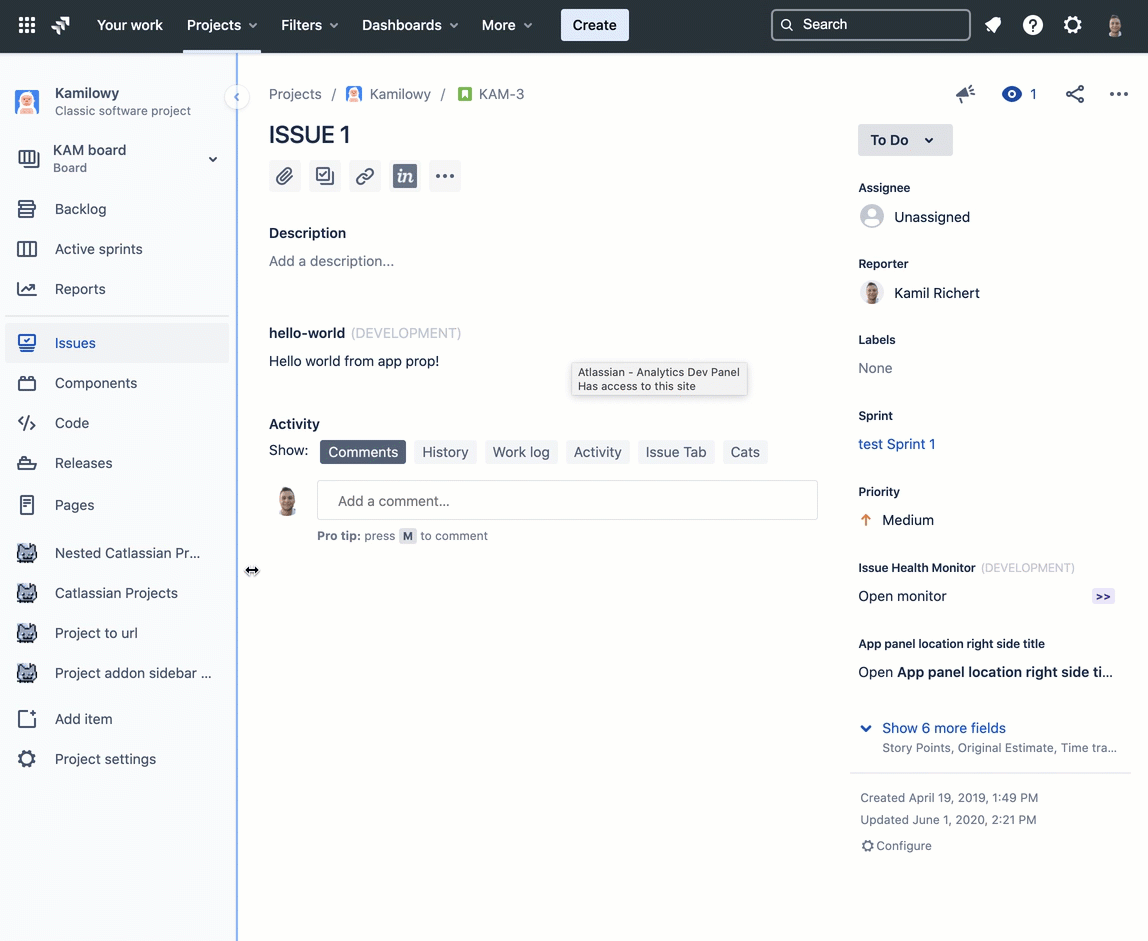- Action validator (Preview)
- Admin page
- Backlog action (Preview)
- Board action (Preview)
- Command palette (Preview)
- Custom field
- Custom field type
- Dashboard background script
- Global background script (Preview)
- Dashboard gadget
- Entity property
- Full page (Preview)
- Global page
- Global permission
- Issue action
- Issue activity
- Issue context
- Issue glance
- Issue navigator action (Preview)
- Issue panel
- Issue view background script
- JQL function
- Personal settings page (Preview)
- Project page
- Project permission
- Project settings page
- Sprint action (Preview)
- Time tracking provider (Preview)
- UI modifications
- Workflow validator (Preview)
- Workflow condition (Preview)
- Workflow post function (Preview)
Jira issue activity
The jira:issueActivity module adds a item to the Activity panel of Jira issues.
This module can be used in Jira and Jira Service Management. It works in the new issue view but not the old issue view. For more information, see the IssueActivity component documentation.

Manifest example
1 2modules: jira:issueActivity: - key: hello-world-issue-activity resource: main resolver: function: resolver render: native title: Hello World!
Properties
| Property | Type | Required | Description |
|---|---|---|---|
key |
| Yes |
A key for the module, which other modules can refer to. Must be unique within the manifest. Regex: |
resource | string | If using Custom UI or modern versions of UI Kit | The key of a static resources entry that your module will display. See resources for more details. |
render | 'native' | If using modern versions of UI Kit | Indicates the module uses UI Kit. |
resolver | { function: string } or{ endpoint: string } |
Set the Set the | |
viewportSize | 'small', 'medium', 'large' or 'xlarge' | The display size of resource. Can only be set if the module is using the resource property. Remove this property to enable automatic resizing of the module. | |
title | string or i18n object | Yes |
The title of the issue activity, which is displayed as a tab item. The |
displayConditions | object | The object that defines whether or not a module is displayed in the UI of the app. See display conditions. |
i18n object
| Key | Type | Required | Description |
|---|---|---|---|
i18n | string | Yes | A key referencing a translated string in the translation files. For more details, see Translations. |
Extension data
UI Kit and Custom UI
Use the useProductContext hook to access the extension context in UI Kit or getContext bridge method in Custom UI.
| Property | Type | Description |
|---|---|---|
type | string | The type of the module. |
issue.id | string | The id of the issue on which the module is rendered. |
issue.key | string | The key of the issue on which the module is rendered. |
issue.type | string | The type of the issue on which the module is rendered. |
issue.typeId | string | The id of the type of the issue on which the module is rendered. |
project.id | string | The id of the project where the module is rendered. |
project.key | string | The key of the project where the module is rendered. |
project.type | string | The type of the project where the module is rendered. |
location | string | The full URL of the host page where this module is displayed. |
Extension context
| Property | Type | Description |
|---|---|---|
type | string | The type of the module. |
Platform context
| Property | Type/value | Description |
|---|---|---|
issueId | string | The ID of the issue on which the module is rendered. |
issueKey | string | The key of the issue on which the module is rendered. |
issueType | string | The type of the issue on which the module is rendered. |
issueTypeId | string | The ID of the type of the issue on which the module is rendered. |
projectId | string | The ID of the project where the module is rendered. |
projectKey | string | The key of the project where the module is rendered. |
projectType | string | The type of the project where which the module is rendered. |
Events
Apps can receive frontend events that will notify your app when an issue has been changed. These events are triggered when an issue is updated or commented on, and are only available for Jira issue view modules.
1 2import { events } from "@forge/bridge"; events.on("JIRA_ISSUE_CHANGED", (data) => { console.log("JIRA_ISSUE_CHANGED (Forge)", data); });
However, if you have multiple issue view modules in your app, you should use the Jira issue view background script module or its Connect counterpart. This will give you a central place for fetching issue details, thus reducing the number of network requests and improving the user experience. Fetching issue details separately for every module would introduce unnecessary overhead and degrade performance.
Data shape
1 2{ "issueId": string, "projectId": string, "changes":[{ "changeType": "updated" | "commented", "atlassianId": string }] }
| Property | Description |
|---|---|
issueId | ID of the issue the app is rendered on. |
projectId | ID of the project the issue belongs to. |
changes | List of issue changes
|
Limitations
- There is a delay between the moment the issue is modified and when the event is emitted. It might take up to a few seconds.
- When the issue is modified by the user who is currently viewing it, it will not be refreshed. This is because we assume the change was made by that same user and there is no need for an update.
Rate this page: